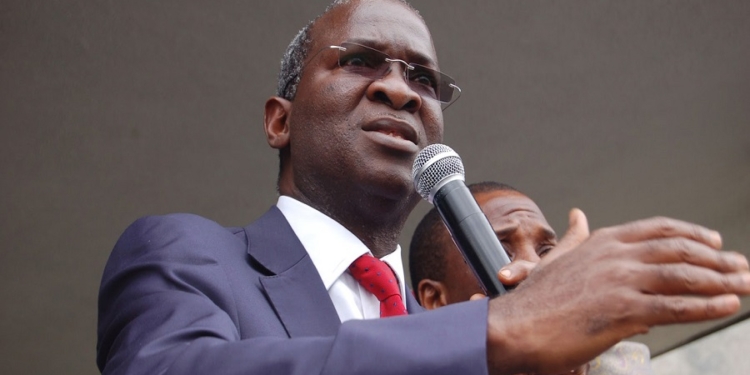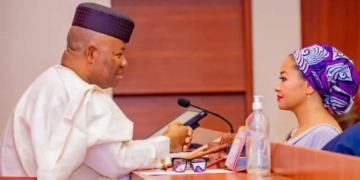Winston Churchill, one of most remarkable or arguably the most remarkable British Leader in the modern history of Britain stated thus “it is not enough that we do our best, sometimes we must do what is required”.
Mr Babatunde Raji Fashola SAN popularly referred to as BRF is not just gifted with reasoning, he is a sterling administrator comparable to that of “Lee Kuan Yew’s revolutionary pragmatism”.
During his tenure as Governor of Lagos State, he exhibited uncommon passion for educational advancement while respecting the reality in his usual brilliance. In exhibiting his believe for a robust investment in tertiary education, he alluded to and worked towards the attainment of the UNESCO-recommended 26% benchmark budgetary allocation to education by introducing a deliberate multi-sectoral approach which this writer has tagged SYNERGY MODEL.
Simply put, in addition to the substantive budgetary allocations and subventions, infrastructural development was not left to the management of tertiary institutions or the Ministry of Education alone but respective MDAs were involved in projects that are related to their agencies on various State owned tertiary institutions.
Expectedly, this informed native intelligence birthed progressive results, exposing a lot of administrators to better and innovative ways of developing educational sector despite financial and fiscal limitations.
Astonishingly, Fashola’s administrative intelligence seems forever qualitative. As a Minister heading three strategic ministries during the first term of President Muhammadu Buhari (2015-2019) namely, Ministry of power, works and housing he saw the need to channel and synergize infrastrutural activities of these Ministries with improvement of educational sector especially the tertiary institutions and commenced the infrastructural revolution in campuses during the first term.
Nigeria’s infrastructural deficits seem to be so intimidating that development of critical facilities in tertiary institutions had been neglected, both in the first generation citadel and the new ones, including the recently established tertiary institutions.
It must be emphasized that students of different federal tertiary institutions had been “nursing” discomforts, hardship and regrets due to the infrastructural conditions of these institutions. Poor road facilities leading to more cost of transportation, poor shelter, catastrophes of flood, epileptic power supply etc. The biggest victims are the recently established tertiary institutions between 2012-14.
While aggressively addressing the infrastructural deficit across the country, Mr Babatunde Fashola thought it wise to accommodate the tertiary institutions which are faced with enormous infrastructural deficits due to long time abandonment and neglect.
First of his innovative ideas was the Energizing Education Project EEP, which seek to provide adequate, clean, sustainable and uninterrupted power supply to 38 federal universities and Teaching hospitals through energy-mix.The huge impact of this on research, teaching and general wellbeing of both staff and students cannot be overemphasized. The EEP were at different advanced stages of execution as at the end of President Buhari’s first term in 2019.
Another instructive and innovative milestone was the construction of internal road networks in 43 federal tertiary institutions including universities, polytechnics and colleges of education. By January 2020, Eighteen (18) of the 43 road projects were completed and handed over to the management, staff and students of respective institutions, while the remaining 25 are at different advanced level of completion.
Some of the institutions that benefited and where the projects are already completed and handed over include; University College Hospital and University of Ibadan, Kaduna Polytechnic, Federal University Lokoja, Federal University of Technology Owerri, University of Benin, Federal University Gashua-Yobe state, Federal University of Technology Akure, Bayero University Kano, University of Nigeria Nsukka, Federal Polytechnic Ede, University of Maiduguri, Federal Polytechnic Offa, Federal University, Oye Ekiti, University of Calabar, Federal Polytechnic Kaura Namoda-Zamfara state, and Federal college of education, Katsina. Some of the fascinating observation about these projects include the simultaneous execution of all and the geographical spread. Like other landmark road and national housing projects, the six geopolitical zones got fair attention.
In acknowledgement and appreciation of these rare infrastructural interventions by the Federal Ministry of works and the Buhari’s NEXT LEVEL administration, Some students’ leaders who witnessed the handing over events on their respective campuses including Sulaiman Muhammad of University of MAIDUGURI and the North East/North Central coordinator NANS, Miss Ayoola Kayode-SUG vice president of Federal polytechnic Ede-Osun state, Muhammed Haruna- SUG president Federal Polytechnic Gashua-Yobe State, Abiola Azeez – SUG president Federal Polytechnic Offa-Kwara State, Timothy Eberechukwu -SUG president of Federal University of Technology Owerri-Imo State, Anifowose Tope, SUG president of Federal University Oye-Ekiti, Ekiti State and Egwu Benjamin- SUG president of University of Benin, Edo State all expressed satisfactions and happiness in appreciation of these infrastructural interventions and also encouraged other ministries and MDAs to imbibe the “multi-sectoral approach in contributing to the educational sector” especially tertiary institutions.
Furthermore, it must also be emphasized that Mr Babatunde Fashola did not only direct the execution of these internal road projects on campuses but mandated the contractors to employ and engage students of respective tertiary institutions that benefited from the projects, most especially students in engineering/vocational related courses. While gaining practical knowledge along the value chain of project execution, the students get stipends for their efforts.This is another depiction of “innovative execution” as productivity, human capital and skill development are channeled towards infrastructural development to deepen scientific and technological research. This is undoubtedly remarkable.
Aggressive infrastructural developments enjoying “never seen before” attention are also ongoing. The long abandoned Lagos-Ibadan road experiencing revival, the very strategic second Niger Bridge nearing completion, National housing projects etc, enjoying reinvention. These projects are based on conditions of employing locals in their execution by contractors.
I was on an essential visit to ibadan few days ago and decided to check out the ongoing works at the site of National housing project NHP located between the new abbatior and the Kola Daisi University along Ojoo -Oyo road. Aside the dozens of completed and ready-for-occupation 3 and 2 bedrooms blocks of semi-detached bongalows, there was also a giant 4-floor condominium housing 24 flats of 2,3&4 bedroom flats.
The supervising architect on site said all of the above was just the phase one and that work has begun on the phase two, as contractors were already mobilized by the FMWH for same. Essential amenities and infrastrutures like inter-connective roads with drainage system, central electrical installations and central water installations with double tanks of combined capacity of 128,000 litres each on phase 1 and 2 were already fully installed.
From my observation however, I couldn’t help but noticed that the NHP is not only about cement, sand or granites,but also about the boosting the economic wellbeing of the locals, their immediate community and extension. This was evident in the excitement I observed among the bricklayers, welders, labourers, carpenters, food vendors, electricians, local security guards, tipper drivers from the quarries, not forgetting the architects, engineers and surveyors. This kind of economic prosperity and viability is a common place and experience among the locals in all the communities where the NHP is ongoing across 34 states in Nigeria.
A private real state company has taken advantage of the potential turnover on investment from the NHP by acquiring a huge expanse of land adjacent the site of the NHP in ibadan for the construction of a ‘Smart City’.
In conclusion, Mr Babatunde Fashola has brought more inspiration to campuses by masterminding projects through his Ministry and ensuring students are part of the project executions. These progressive achivements deserve commendation and very necessary for such to be promoted to encourage other federal ministries and MDAs to also be part of the “multi-sectoral approach” towards improving educational sector in the #NEXTLEVEL project that President Muhammadu Buhari is determined to deliver to Nigerians and Nigeria.




Discussion about this post